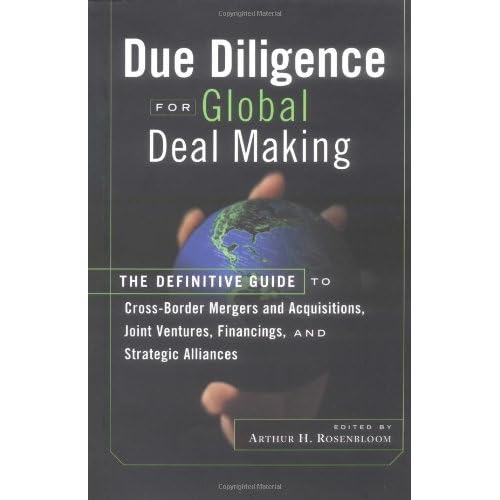 Due Diligence for Global Deal Making - The Definitive Guide to Cross-Border M&.pdf
(1.29 MB, 需要: 10 个论坛币)
Due Diligence for Global Deal Making - The Definitive Guide to Cross-Border M&.pdf
(1.29 MB, 需要: 10 个论坛币)
作者简介Arthur Rosenbloom is managing director of CFC Capital Corp. and former chairman of the board of Patricof & Co. Capital Corp. His contributions on investment banking-related topics have appeared in Forbes, BusinessWeek, the Harvard Business Review, and the National Law Journal. An adjunct professor of finance at the Stern Graduate School of Business at New York University and NYU Law School, he also is a trustee of New York's Citizens Budget Commission, a member of its Competitiveness Subcommittee, and an active member of the panel of arbitrators of the American Arbitration Association and the New York Stock Exchange. 目录About the Contributors. Chapter 1: Due Diligence in the Global Economy (Arthur H. Rosenbloom). What Is Due Diligence? Types of Due Diligence. Who Is Involved in Due Diligence? What Constitutes Legal Due Diligence? What Constitutes Financial Due Diligence? What Constitutes Operational Due Diligence? Integrating Due Diligence Efforts. Chapter 2: Strategic Due Diligence (Geoff Cullinan and Tom Holland). Strategy Precedes Due Diligence. Reviewing Your Strategy. Costs. Customers. Competitors. Capabilities. Achieving Value. Factoring in Cross-Border Complexities. Identifying Your Strategic Rationale. Active Investing. Scale. Adjacency. Scope. Transformation. Undertaking Thorough Due Diligence. Market Definition. Industry Dynamics and Trends. Competitor Market Map. Competitor Dynamics . Competitor Benchmarking. Customer Analysis, Input Costs, and Price Elasticity. Growth Opportunities. Cross-Border Complications. Key Factors in Evaluating Strategic Rationales. Due Diligence for Scale-Driven Transactions. Due Diligence for Adjacency-Driven Transactions. Due Diligence for Scope-Driven Transactions. Due Diligence for Transformation-Driven Transactions. Assessing Your Findings. Checklist: Cross-Border Strategic Due Diligence. Chapter 3: Operational Due Diligence (Linda D. Arrington, Nelson M. Fraiman, Carolyn E.C. Paris, and Michael L. Pinedo). Operational Due Diligence in the Cross-Border Context. Designing Due Diligence from a Strategic Perspective. Validating and Integrating Other Due Diligence Efforts. Serving as the Foundation for the Integration Plan. Serving in Support of Deal Strategy and Pricing. What Should Operational Due Diligence Cover? Mapping the Value-Creation Process. Products and Services, Market Positioning and Brand, Sales and Distribution, and Customers. Manufacturing or Other Production of Goods/Services. Procurement of Supplies and Supply-Chain Management: Possible Related Reconfiguration of Distribution Processes, External Infrastructure Requirements, and System Cash Needs. Systems and Know-How Support of the Value-Creation Process. People, Training, and Corporate Culture. What Can Go Wrong. Deals That Got It Right. Checklist: Cross-Border Operational Due Diligence. Chapter 4: Financial and Accounting Due Diligence (Jorge M. Diaz). Addressing All Aspects--Whether Large or Small. Financial Due Diligence Procedures. How to Verify the Numbers. Inbound Transactions. Outbound Transactions in Developed Countries. Outbound Transactions in Emerging Markets. Accounting Due Diligence Procedures. Integrity and Qualifications of Company Personnel, Their Practices, and Ethical Standards. Relationship with Independent Certified Public Accountants. Considerations in Evaluating Key Accounting Issues. Statutory, Regulatory, and Legal Requirements. Industry Accepted and Generally Accepted Accounting Principles. Industry Practices. Income Tax Laws and Regulations. Data Processing Systems. Political Environment in the Target's Country Checklist: Cross-Border Financial and Accounting Due Diligence. Chapter 5: Legal Due Diligence (Norman J. Resnicow, Esq. and Clifford A. Rathkopf, Esq.). "Legalese" across Borders. The Purpose of Legal Due Diligence: Insurance against the Unknown. A Good Deal Is Vastly Better Than a Good Lawsuit. Defensive Due Diligence in U.S. Public Securities Issuance. Transactions: Proving Enough Was Done. Forces Working to Limit Due Diligence: Quick Decision Makers versus Slow Scriveners. Avoiding Ruffled Feathers and Missed Opportunities. Fitting Due Diligence into the Structure and Timing of the Deal: Sooner Is Better. Organizing and Executing Legal Due Diligence: The Buck Stops at the Top. Assigning Qualified Personnel. Organizing and Delegating Duties. Ensuring a Searching Investigation. Communicating Results Effectively. Certain Key Risk Exposure Areas in Legal Due Diligence. Environmental. Antitrust. Intellectual Property. National Security Implications. Litigation. Security Interests of Creditors. Terminating Employment and Marketing Relationships. without Liability. The Preferred Result of Legal Due Diligence: No News Is Good News. Checklist: Cross-Border Legal Due Diligence. Chapter 6: Tax Due Diligence (Robert T. Bossart, Esq.). Compliance versus Planning. Due Diligence Coordination. Local, National, and International Perspective. A Word about Joint Ventures. Taxable Purchase of Assets. Understanding the Target’s Operations and Structure. International Federal Tax Compliance Due Diligence. Foreign Subsidiary Shares as Part of the Target’s Assets. Transfer Pricing. Nonfederal Tax Due Diligence in an Asset Acquisition. Asset Acquisition Planning Opportunities: Overview. Taxable Share Purchases. Tax Compliance. Transactions and Tax Reserves. Consolidated Returns, Attributes, and Accounting Methods. Withholding Taxes. Employee Benefits. Foreign Tax Credits and Exemptions. Tax Attributes. Structuring the Share Acquisition. Tax-Free Exchanges. Checklist: Cross-Border Tax Due Diligence. Chapter 7: People and Organizational Due Diligence (Cynthia N. Wood, PhD and Richard C. Porter). General Considerations. Strategic Objectives. Type of Deal. Composition of the Organizational Due Diligence Team. Impact of Organizational Experience and Cultural Milieu. Negotiations. Key Components of Organizational Due Diligence. Organizational Performance Measures. Cultural Factors. Mission, Vision, and Values. Communications Patterns and Processes. People Issues. Overall Organizational Structure. Functional Areas. Checklist: Cross-Border Organizational Due Diligence Process. Chapter 8: Due Diligence Investigative Technology and Know-How (James B. Mintz). How Investors Use Private Investigators. How Investigative Technology Can Help. The International Public Record. The Hometown Newspaper. The Backgrounds of Key Executives. Prime Questions Investigators Must Explore. Resolution through Follow-up Investigation. The Business Practices of the Target Company. Regulatory Issues. Concerns about Intellectual Property. Business Disputes. Increased Pressure on Due Diligence Professionals. Checklist: Due Diligence Investigative Technology and Know-How. Appendix: Cross-Border Due Diligence in an Age of International Terrorism. Index. | |||





 雷达卡
雷达卡





 京公网安备 11010802022788号
京公网安备 11010802022788号







